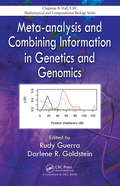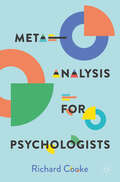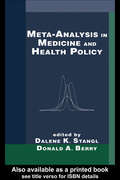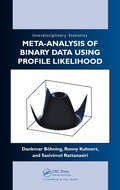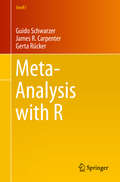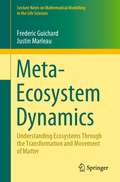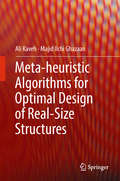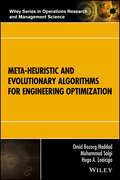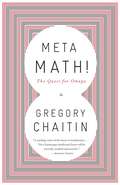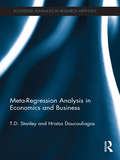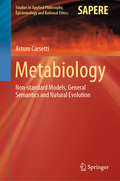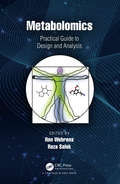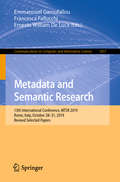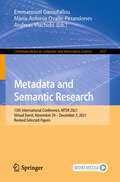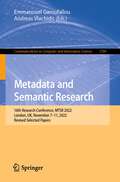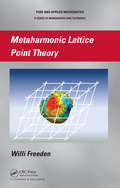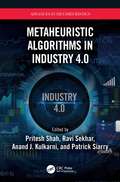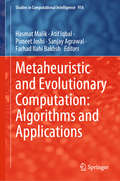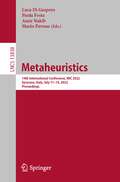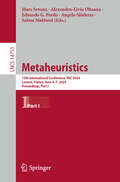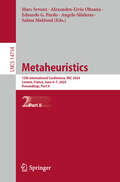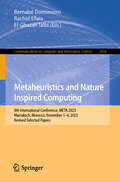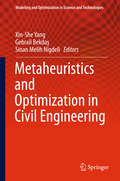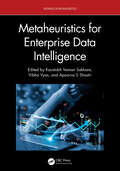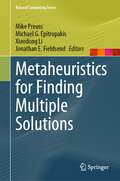- Table View
- List View
Meta-analysis and Combining Information in Genetics and Genomics (Chapman & Hall/CRC Computational Biology Series)
by Rudy Guerra Darlene R. GoldsteinNovel Techniques for Analyzing and Combining Data from Modern Biological StudiesBroadens the Traditional Definition of Meta-AnalysisWith the diversity of data and meta-data now available, there is increased interest in analyzing multiple studies beyond statistical approaches of formal meta-analysis. Covering an extensive range of quantitative infor
Meta-Analysis for Psychologists
by Richard CookeThis textbook provides a comprehensive, user-friendly guide to meta-analysis and how to conduct it, using open source software and based on examples commonly found in the field of psychology. Meta-analysis is a key tool used in systematic literature reviews to synthesize research findings across studies, but despite being relatively straightforward to perform, it remains underused by psychologists. In the first section the reader is introduced to key ideas that underlie meta-analysis and how it might be best employed. Following this the reader is guided through how to run a meta-analysis of correlational studies and experimental studies using the free and open statistical software JAMOVI. In the concluding section Professor Cooke considers common issues, key debates and examines the relative merits of different analyses and different software packages.Covers theory, key issues and step-by-step demonstrationsIncludes examples worked examples familiar to psychologists and datasetsCompanion videos demonstrate the methods outlinedIt will provide a valuable new resource for postgraduate students and researchers in the behavioural and social sciences looking to enhance their methodological skills.
Meta-Analysis in Medicine and Health Policy (Chapman & Hall/CRC Biostatistics Series)
by Dalene K. Stangl Donald A. BerryThis remarkable text raises the analysis of data in health sciences and policy to new heights of refinement and applicability by introducing cutting-edge meta-analysis strategies while reviewing more commonly used techniques. Each chapter builds on sound principles, develops methodologies to solve statistical problems, and presents concrete applications used by experienced medical practitioners and health policymakers. Written by more than 30 celebrated international experts, Meta-Analysis in Medicine and Health Policy employs copious examples and pictorial presentations to teach and reinforce biostatistical techniques more effectively and poses numerous open questions of medical and health policy research.
Meta-analysis of Binary Data Using Profile Likelihood (Chapman & Hall/CRC Interdisciplinary Statistics)
by Dankmar Bohning Sasivimol Rattanasiri Ronny KuhnertProviding reliable information on an intervention effect, meta-analysis is a powerful statistical tool for analyzing and combining results from individual studies. Meta-Analysis of Binary Data Using Profile Likelihood focuses on the analysis and modeling of a meta-analysis with individually pooled data (MAIPD). It presents a unifying approac
Meta-Analysis with R
by Guido Schwarzer James R. Carpenter Gerta RückerThis book provides a comprehensive introduction to performing meta-analysis using the statistical software R. It is intended for quantitative researchers and students in the medical and social sciences who wish to learn how to perform meta-analysis with R. As such, the book introduces the key concepts and models used in meta-analysis. It also includes chapters on the following advanced topics: publication bias and small study effects; missing data; multivariate meta-analysis, network meta-analysis; and meta-analysis of diagnostic studies.
Meta-Ecosystem Dynamics: Understanding Ecosystems Through the Transformation and Movement of Matter (Lecture Notes on Mathematical Modelling in the Life Sciences)
by Frederic Guichard Justin MarleauThis book presents current meta-ecosystem models and their derivation from classical ecosystem and metapopulation theories. Specifically, it reviews recent modelling efforts that have emphasized the role of nonlinear dynamics on spatial and food web networks, and which have cast their implications within the context of spatial synchrony and ecological stoichiometry. It suggests that these recent advances naturally lead to a generalization of meta-ecosystem theories to spatial fluxes of matter that have both a trophic and non-trophic impact on species. Ecosystem dynamics refers to the cycling of matter and energy across ecological compartments through processes such as consumption and recycling. Spatial dynamics established its ecological roots with metapopulation theories and focuses on scaling up local ecological processes through the limited movement of individuals and matter. Over the last 15 years, theories integrating ecosystem and spatial dynamics have quickly coalesced into meta-ecosystem theories, the focus of this book. The book will be of interest to graduate students and researchers who wish to learn more about the synthesis of ecosystem and spatial dynamics, which form the foundation of the theory of meta-ecosystems.
Meta-heuristic Algorithms for Optimal Design of Real-Size Structures
by Ali Kaveh Majid Ilchi GhazaanThe contributions in this book discuss large-scale problems like the optimal design of domes, antennas, transmission line towers, barrel vaults and steel frames with different types of limitations such as strength, buckling, displacement and natural frequencies. The authors use a set of definite algorithms for the optimization of all types of structures. They also add a new enhanced version of VPS and information about configuration processes to all chapters. Domes are of special interest to engineers as they enclose a maximum amount of space with a minimum surface and have proven to be very economical in terms of consumption of constructional materials. Antennas and transmission line towers are the one of the most popular structure since these steel lattice towers are inexpensive, strong, light and wind resistant. Architects and engineers choose barrel vaults as viable and often highly suitable forms for covering not only low-cost industrial buildings, warehouses, large-span hangars, indoor sports stadiums, but also large cultural and leisure centers. Steel buildings are preferred in residential as well as commercial buildings due to their high strength and ductility particularly in regions which are prone to earthquakes.
Meta-heuristic and Evolutionary Algorithms for Engineering Optimization
by Omid Bozorg-Haddad Mohammad Solgi Hugo A. LoáicigaA detailed review of a wide range of meta-heuristic and evolutionary algorithms in a systematic manner and how they relate to engineering optimization problems This book introduces the main metaheuristic algorithms and their applications in optimization. It describes 20 leading meta-heuristic and evolutionary algorithms and presents discussions and assessments of their performance in solving optimization problems from several fields of engineering. The book features clear and concise principles and presents detailed descriptions of leading methods such as the pattern search (PS) algorithm, the genetic algorithm (GA), the simulated annealing (SA) algorithm, the Tabu search (TS) algorithm, the ant colony optimization (ACO), and the particle swarm optimization (PSO) technique. Chapter 1 of Meta-heuristic and Evolutionary Algorithms for Engineering Optimization provides an overview of optimization and defines it by presenting examples of optimization problems in different engineering domains. Chapter 2 presents an introduction to meta-heuristic and evolutionary algorithms and links them to engineering problems. Chapters 3 to 22 are each devoted to a separate algorithm— and they each start with a brief literature review of the development of the algorithm, and its applications to engineering problems. The principles, steps, and execution of the algorithms are described in detail, and a pseudo code of the algorithm is presented, which serves as a guideline for coding the algorithm to solve specific applications. This book: Introduces state-of-the-art metaheuristic algorithms and their applications to engineering optimization; Fills a gap in the current literature by compiling and explaining the various meta-heuristic and evolutionary algorithms in a clear and systematic manner; Provides a step-by-step presentation of each algorithm and guidelines for practical implementation and coding of algorithms; Discusses and assesses the performance of metaheuristic algorithms in multiple problems from many fields of engineering; Relates optimization algorithms to engineering problems employing a unifying approach. Meta-heuristic and Evolutionary Algorithms for Engineering Optimization is a reference intended for students, engineers, researchers, and instructors in the fields of industrial engineering, operations research, optimization/mathematics, engineering optimization, and computer science. OMID BOZORG-HADDAD, PhD, is Professor in the Department of Irrigation and Reclamation Engineering at the University of Tehran, Iran. MOHAMMAD SOLGI, M.Sc., is Teacher Assistant for M.Sc. courses at the University of Tehran, Iran. HUGO A. LOÁICIGA, PhD, is Professor in the Department of Geography at the University of California, Santa Barbara, United States of America.
Meta Math!: The Quest for Omega
by Gregory ChaitinIn Meta Math!, Gregory Chaitin, one of the world’s foremost mathematicians, leads us on a spellbinding journey of scientific discovery and illuminates the process by which he arrived at his groundbreaking theories. All of science is based on mathematics, but mathematicians have become painfully aware that math itself has serious limitations. This notion was first revealed in the work of two giants of twentieth-century mathematics: Kurt Gödel and Alan Turing. Now their successor, Gregory Chaitin, digs even deeper into the foundations of mathematics, demonstrating that mathematics is riddled with randomness, enigmas, and paradoxes. Chaitin’s revolutionary discovery, the Omega number, is an exquisitely complex representation of unknowability in mathematics. His investigations shed light on what, ultimately, we can know about the universe and the very nature of life. But if unknowability is at the core of Chaitin’s theories, the great gift of his book is its completely engaging knowability. In an infectious and enthusiastic narrative, Chaitin introduces us to his passion for mathematics at its deepest and most philosophical level, and delineates the specific intellectual and intuitive steps he took toward the discovery of Omega. In the final analysis, he shows us that mathematics is as much art as logic, as much experimental science as pure reasoning. And by the end, he has helped us to see and appreciate the art––and the sheer beauty––in the science of math. In Meta Math!, Gregory Chaitin takes us to the very frontiers of scientific thinking. It is a thrilling ride. From the Hardcover edition.
Meta-Regression Analysis in Economics and Business (Routledge Advances In Research Methods Ser. #5)
by Hristos Doucouliagos T.D. StanleyThe purpose of this book is to introduce novice researchers to the tools of meta-analysis and meta-regression analysis and to summarize the state of the art for existing practitioners. Meta-regression analysis addresses the rising "Tower of Babel" that current economics and business research has become. Meta-analysis is the statistical analysis of previously published, or reported, research findings on a given hypothesis, empirical effect, phenomenon, or policy intervention. It is a systematic review of all the relevant scientific knowledge on a specific subject and is an essential part of the evidence-based practice movement in medicine, education and the social sciences. However, research in economics and business is often fundamentally different from what is found in the sciences and thereby requires different methods for its synthesis—meta-regression analysis. This book develops, summarizes, and applies these meta-analytic methods.
Metabiology: Non-standard Models, General Semantics and Natural Evolution (Studies in Applied Philosophy, Epistemology and Rational Ethics #50)
by Arturo CarsettiIn the context of life sciences, we are constantly confronted with information that possesses precise semantic values and appears essentially immersed in a specific evolutionary trend. In such a framework, Nature appears, in Monod’s words, as a tinkerer characterized by the presence of precise principles of self-organization. However, while Monod was obliged to incorporate his brilliant intuitions into the framework of first-order cybernetics and a theory of information with an exclusively syntactic character such as that defined by Shannon, research advances in recent decades have led not only to the definition of a second-order cybernetics but also to an exploration of the boundaries of semantic information. As H. Atlan states, on a biological level "the function self-organizes together with its meaning". Hence the need to refer to a conceptual theory of complexity and to a theory of self-organization characterized in an intentional sense. There is also a need to introduce, at the genetic level, a distinction between coder and ruler as well as the opportunity to define a real software space for natural evolution. The recourse to non-standard model theory, the opening to a new general semantics, and the innovative definition of the relationship between coder and ruler can be considered, today, among the most powerful theoretical tools at our disposal in order to correctly define the contours of that new conceptual revolution increasingly referred to as metabiology. This book focuses on identifying and investigating the role played by these particular theoretical tools in the development of this new scientific paradigm. Nature "speaks" by means of mathematical forms: we can observe these forms, but they are, at the same time, inside us as they populate our organs of cognition. In this context, the volume highlights how metabiology appears primarily to refer to the growth itself of our instruments of participatory knowledge of the world.
Metabolomics: Practical Guide to Design and Analysis (Chapman & Hall/CRC Computational Biology Series)
by Ron Wehrens and Reza SalekMetabolomics is the scientific study of the chemical processes in a living system, environment and nutrition. It is a relatively new omics science, but the potential applications are wide, including medicine, personalized medicine and intervention studies, food and nutrition, plants, agriculture and environmental science. The topics presented and discussed in this book are based on the European Molecular Biology Organization (EMBO) practical courses in metabolomics bioinformatics taught to those working in the field, from masters to postgraduate students, PhDs, postdoctoral and early PIs. The book covers the basics and fundamentals of data acquisition and analytical technologies, but the primary focus is data handling and data analysis. The mentioning and usage of a particular data analysis tool has been avoided; rather, the focus is on the concepts and principles of data processing and analysis. The material has been class-tested and includes lots of examples, computing and exercises. Key Features: Provides an overview of qualitative /quantitative methods in metabolomics Offers an introduction to the key concepts of metabolomics, including experimental design and technology Covers data handling, processing, analysis, data standards and sharing Contains lots of examples to illustrate the topics Includes contributions from some of the leading researchers in the field of metabolomics with extensive teaching experiences
Metadata and Semantic Research: 13th International Conference, MTSR 2019, Rome, Italy, October 28–31, 2019, Revised Selected Papers (Communications in Computer and Information Science #1057)
by Emmanouel Garoufallou Francesca Fallucchi Ernesto William De LucaThis book constitutes the thoroughly refereed proceedings of the 13th International Conference on Metadata and Semantic Research, MTSR 2019, held in Rome, Italy, in October 2019. The 27 full and 15 short papers presented were carefully reviewed and selected from 96 submissions. The papers are organized in the following tracks: metadata and semantics for digital libraries, information retrieval, big, linked, social and open data; metadata and semantics for agriculture, food, and environment; digital humanities and digital curation; cultural collections and applications; european and national projects; metadata, identifiers and semantics in decentralized applications, blockchains and P2P systems.
Metadata and Semantic Research: 15th International Conference, MTSR 2021, Virtual Event, November 29 – December 3, 2021, Revised Selected Papers (Communications in Computer and Information Science #1537)
by Emmanouel Garoufallou María-Antonia Ovalle-Perandones Andreas VlachidisThis book constitutes the thoroughly refereed proceedings of the 15th International Conference on Metadata and Semantic Research, MTSR 2021, held as a virtual event in November-December 2021. The 27 full and 7 short papers presented were carefully reviewed and selected from 92 submissions. The papers are organized in the following topical sections: metadata, linked data, semantics and ontologies - general session, and track on agriculture, food and environment; track on open repositories, research information systems and data infrastructures; track on knowledge IT artifacts (KITA) and decentralized applications, blockchains and P2P systems, and general session; track on digital humanities and digital curation, and general session; track on digital libraries, information retrieval, big, linked, social and open data; track on european and national projects, and general session; track on cultural collections and applications, and general session.
Metadata and Semantic Research: 16th Research Conference, MTSR 2022, London, UK, November 7–11, 2022, Revised Selected Papers (Communications in Computer and Information Science #1789)
by Emmanouel Garoufallou Andreas VlachidisThis book constitutes the refereed post proceedings of the 16th Research Conference onMetadata and Semantic Research, MTSR 2022, held in London, UK, during November 7–11, 2022.The 21 full papers and 4 short papers included in this book were carefully reviewed andselected from 79 submissions. They were organized in topical sections as follows: metadata, linked data, semantics and ontologies - general session, and track on Knowledge IT Artifacts (KITA), Track on digital humanities and digital curation, and track on cultural collections and applications, track on digital libraries, information retrieval, big, linked, social & open data, and metadata, linked data, semantics and ontologies - general session, track on agriculture, food & environment, and metadata, linked Data, semantics and ontologies - general, track on open repositories, research information systems & data infrastructures, and metadata, linked data, semantics and ontologies - general, metadata, linked data, semantics and ontologies - general session, and track on european and national projects.
Metaharmonic Lattice Point Theory (Chapman & Hall Pure and Applied Mathematics)
by Willi FreedenMetaharmonic Lattice Point Theory covers interrelated methods and tools of spherically oriented geomathematics and periodically reflected analytic number theory. The book establishes multi-dimensional Euler and Poisson summation formulas corresponding to elliptic operators for the adaptive determination and calculation of formulas and identities of
Metaheuristic Algorithms in Industry 4.0 (Advances in Metaheuristics)
by Pritesh Shah Ravi Sekhar Anand J. Kulkarni Patrick SiarryDue to increasing industry 4.0 practices, massive industrial process data is now available for researchers for modelling and optimization. Artificial Intelligence methods can be applied to the ever-increasing process data to achieve robust control against foreseen and unforeseen system fluctuations. Smart computing techniques, machine learning, deep learning, computer vision, for example, will be inseparable from the highly automated factories of tomorrow. Effective cybersecurity will be a must for all Internet of Things (IoT) enabled work and office spaces. This book addresses metaheuristics in all aspects of Industry 4.0. It covers metaheuristic applications in IoT, cyber physical systems, control systems, smart computing, artificial intelligence, sensor networks, robotics, cybersecurity, smart factory, predictive analytics and more. Key features: Includes industrial case studies. Includes chapters on cyber physical systems, machine learning, deep learning, cybersecurity, robotics, smart manufacturing and predictive analytics. surveys current trends and challenges in metaheuristics and industry 4.0. Metaheuristic Algorithms in Industry 4.0 provides a guiding light to engineers, researchers, students, faculty and other professionals engaged in exploring and implementing industry 4.0 solutions in various systems and processes.
Metaheuristic and Evolutionary Computation: Algorithms and Applications (Studies in Computational Intelligence #916)
by Hasmat Malik Atif Iqbal Puneet Joshi Sanjay Agrawal Farhad Ilahi BakhshThis book addresses the principles and applications of metaheuristic approaches in engineering and related fields. The first part covers metaheuristics tools and techniques such as ant colony optimization and Tabu search, and their applications to several classes of optimization problems. In turn, the book’s second part focuses on a wide variety of metaheuristics applications in engineering and/or the applied sciences, e.g. in smart grids and renewable energy. In addition, the simulation codes for the problems discussed are included in an appendix for ready reference.Intended for researchers aspiring to learn and apply metaheuristic techniques, and gathering contributions by prominent experts in the field, the book offers readers an essential introduction to metaheuristics, its theoretical aspects and applications.
Metaheuristics: 14th International Conference, MIC 2022, Syracuse, Italy, July 11–14, 2022, Proceedings (Lecture Notes in Computer Science #13838)
by Luca Di Gaspero Paola Festa Amir Nakib Mario PavoneThis book constitutes the refereed proceedings of the 14th International Conference on Metaheuristics, MIC 2022, held in Syracuse, Italy, in July 2022.The 48 full papers together with 17 short papers presented were carefully reviewed and selected from 72 submissions. The papers detail metaheuristic techniques.
Metaheuristics: 15th International Conference, MIC 2024, Lorient, France, June 4–7, 2024, Proceedings, Part I (Lecture Notes in Computer Science #14753)
by Marc Sevaux Angelo Sifaleras Alexandru-Liviu Olteanu Eduardo G. Pardo Salma MakboulThis volume constitutes the refereed proceedings of Metaheuristics on 15th International Conference, MIC 2024, held in Lorient, France, during June 4–7, 2024. The 36 full papers presented together with 34 short papers were carefully reviewed and selected from 127 submissions. The conference focuses on artificial intelligence, combinatorial optimization, computer science, graph theory, evolutionary algorithms, genetic algorithms, simulated annealing, optimization, optimization problems.
Metaheuristics: 15th International Conference, MIC 2024, Lorient, France, June 4–7, 2024, Proceedings, Part II (Lecture Notes in Computer Science #14754)
by Marc Sevaux Angelo Sifaleras Alexandru-Liviu Olteanu Eduardo G. Pardo Salma MakboulThis volume constitutes the refereed proceedings of Metaheuristics on 15th International Conference, MIC 2024, held in Lorient, France, during June 4–7, 2024. The 36 full papers presented together with 34 short papers were carefully reviewed and selected from 127 submissions. The conference focuses on artificial intelligence, combinatorial optimization, computer science, graph theory, evolutionary algorithms, genetic algorithms, simulated annealing, optimization, optimization problems.
Metaheuristics and Nature Inspired Computing: 9th International Conference, META 2023, Marrakech, Morocco, November 1–4, 2023, Revised Selected Papers (Communications in Computer and Information Science #2016)
by Bernabé Dorronsoro El-Ghazali Talbi Rachid EllaiaThis book constitutes the refereed proceedings of the 9th International Conference on Metaheuristics and Nature Inspired Computing, META 2023, held in Marrakech, Morocco, during November 1-4, 2023. The 19 full papers presented in this volume were carefully reviewed and selected from 42 submissions. The papers are divided into the following topical sections: combinatorial optimization; scheduling; continuous optimization; automatic metaheuristics tuning; optimization and machine learning; and applications.
Metaheuristics and Optimization in Civil Engineering
by Sinan Melih Nigdeli Gebrail Bekdaş Xin-She YangThis timely book deals with a current topic, i. e. the applications of metaheuristic algorithms, with a primary focus on optimization problems in civil engineering. The first chapter offers a concise overview of different kinds of metaheuristic algorithms, explaining their advantages in solving complex engineering problems that cannot be effectively tackled by traditional methods, and citing the most important works for further reading. The remaining chapters report on advanced studies on the applications of certain metaheuristic algorithms to specific engineering problems. Genetic algorithm, bat algorithm, cuckoo search, harmony search and simulated annealing are just some of the methods presented and discussed step by step in real-application contexts, in which they are often used in combination with each other. Thanks to its synthetic yet meticulous and practice-oriented approach, the book is a perfect guide for graduate students, researchers and professionals willing to applying metaheuristic algorithms in civil engineering and other related engineering fields, such as mechanical, transport and geotechnical engineering. It is also a valuable aid for both lectures and advanced engineering students.
Metaheuristics for Enterprise Data Intelligence (Advances in Metaheuristics)
by Apoorva S Shastri Kaustubh Vaman Sakhare Vibha VyasWith the emergence of the data economy, information has become integral to business excellence. Every enterprise, irrespective of its domain of interest, carries and processes a lot of data in their day-to-day activities. Converting massive datasets into insightful information plays an important role in developing better business solutions. Data intelligence and its analysis pose several challenges in data representation, building knowledge systems, issue resolution and predictive systems for trend analysis and decisionmaking. The data available could be of any modality, especially when data is associated with healthcare, biomedical, finance, retail, cybersecurity, networking, supply chain management, manufacturing, etc. The optimization of such systems is therefore crucial to leveraging the best outcomes and conclusions. To this end, AI-based nature-inspired optimization methods or approximation-based optimization methods are becoming very powerful. Notable metaheuristics include genetic algorithms, differential evolution, ant colony optimization, particle swarm optimization, artificial bee colony, grey wolf optimizer, political optimizer, cohort intelligence and league championship algorithm. This book provides a systematic discussion of AI-based metaheuristics application in a wide range of areas, including big data intelligence and predictive analytics, enterprise analytics, graph optimization algorithms, machine learning and ensemble learning, computer vision enterprise practices and data benchmarking.
Metaheuristics for Finding Multiple Solutions (Natural Computing Series)
by Mike Preuss Michael G. Epitropakis Xiaodong Li Jonathan E. FieldsendThis book presents the latest trends and developments in multimodal optimization and niching techniques. Most existing optimization methods are designed for locating a single global solution. However, in real-world settings, many problems are “multimodal” by nature, i.e., multiple satisfactory solutions exist. It may be desirable to locate several such solutions before deciding which one to use. Multimodal optimization has been the subject of intense study in the field of population-based meta-heuristic algorithms, e.g., evolutionary algorithms (EAs), for the past few decades. These multimodal optimization techniques are commonly referred to as “niching” methods, because of the nature-inspired “niching” effect that is induced to the solution population targeting at multiple optima. Many niching methods have been developed in the EA community. Some classic examples include crowding, fitness sharing, clearing, derating, restricted tournament selection, speciation, etc. Nevertheless, applying these niching methods to real-world multimodal problems often encounters significant challenges.To facilitate the advance of niching methods in facing these challenges, this edited book highlights the latest developments in niching methods. The included chapters touch on algorithmic improvements and developments, representation, and visualization issues, as well as new research directions, such as preference incorporation in decision making and new application areas. This edited book is a first of this kind specifically on the topic of niching techniques.This book will serve as a valuable reference book both for researchers and practitioners. Although chapters are written in a mutually independent way, Chapter 1 will help novice readers get an overview of the field. It describes the development of the field and its current state and provides a comparative analysis of the IEEE CEC and ACM GECCO niching competitions of recent years, followed by a collection of open research questions and possible research directions that may be tackled in the future.
